Train trip to the North West and Midlands
On the last weekend I had my second long-distance train trip this year in order to do races in the North West and Midlands. Although the trip ended up nice, the preparation was a mess and I had to written off a few tickets due to changes of circumstances.
Trip planning
I was going for a race in Windermere, from the south to the north. The race registration was 07:15 – 08:00 at Fell Foot Park which was also where the race started, while the finish was at Waterhead, Ambleside. The start time was 09:00 with 9 hours time limit. Therefore my plan was to take trains to Windermere, stay in a hotel for one night, and take a bus from the hotel to the start in the morning.
After the race, I could go home (Cricklewood) directly on trains, with the last possible itinerary departing Windermere at 18:57, changing to the last Avanti West Coast service to Euston at Preston. However, I was also considering to do an orienteering race in Nottingham on the next day as well which would necessitate an overnight stay somewhere en-route, and the primary consideration would be the hotel price since train tickets cost at most £83.65 for a round trip which could be used direct to Windermere, and via Nottingham on the way back.
Avanti trouble
Unfortunately, the “usual” route of getting from my home to Windermere involves travelling on an Avanti West Coast service from London Euston to Oxenholme Lake District. Avanti West Coast is well known for its poor service which it can’t even guarantee it can run its vastly reduced service compared to pre-pandemic, due to bad labour relations leading to its staff refusing to work overtime. In the past quarter, it could only run less than half of its train services on time, the worst operator in the whole Great Britain, compared to 88.1% by the best operator, Elizabeth line.
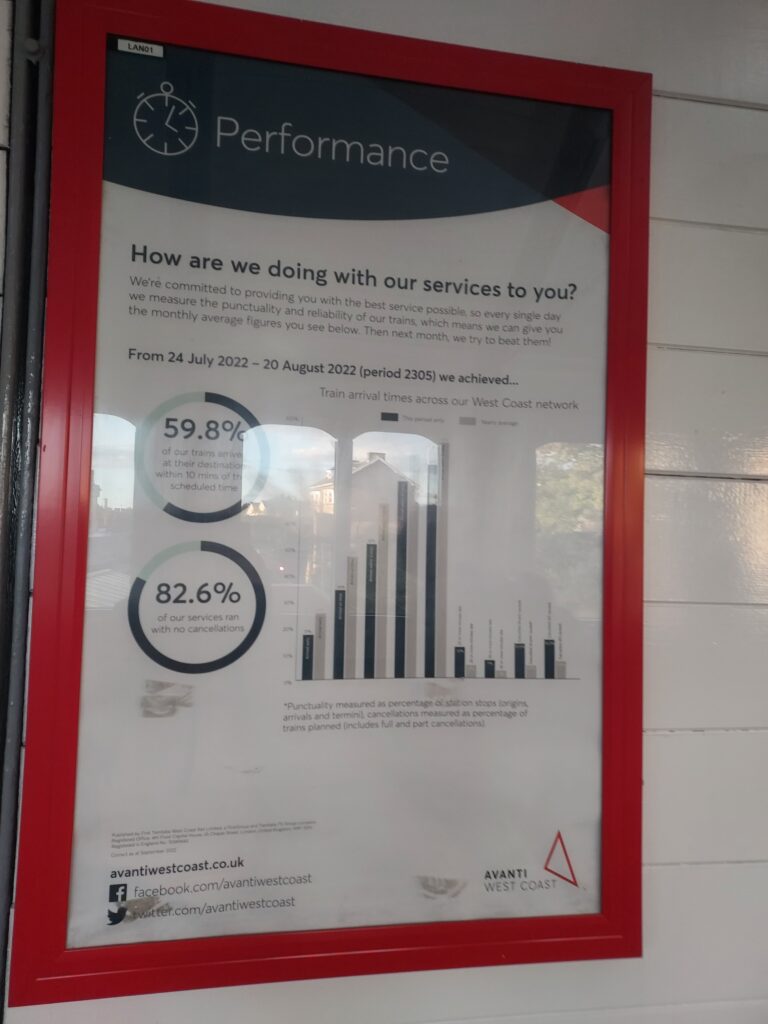
Avanti West Coast was blocking ticket sales for its weekend trains until a few days beforehand which prevented me from working the cost of getting home direct after the race v.s. buying a flexible ticket which would permit me to travel to Nottingham for the orienteering race on the way home. It wasn’t possible to avoid Avanti services if I had to get home immediately after the race, but it was possible for the journey to Windermere on the day before, by taking a combination of slow trains by other operators, where cheap advance purchase fixed-time fares were available.
Another concern was that, there were engineering works scheduled on the weekend which would close the line between Luton and West Hampstead, and I would need to take two rail replacement buses calling at all stops from Luton to get home from Nottingham if I used a flexible return rail ticket, which I preferred not to, but take a non-stop coach from Nottingham to Finchley Road instead. Therefore I would like to ticket my journey using all single tickets.
However, in Great Britain, most flexible single tickets are notoriously expensive to the extent that a single ticket is only 10p less than an off-peak return on most routes. For example, a Super Off-Peak Day Single from Manchester to Nottingham, which can be used without time restrictions on weekends, is only 5p less than the Super Off-Peak Day Return on the same route when a 26-30 Railcard is applied to it (£18.10 for a return v.s. £18.05 for a single), so without the use of fixed-time tickets it would be very expensive to travel on a series of single tickets for my trip. Such pricing is designed to penalise people who want to do triangular journeys, or who want to travel by train one way and using other transport, such as a coach, back, unless there are cheap fixed-time tickets available.
As a result, while the Avanti services weren’t open for booking, I looked for cheap fixed-time ticket on other operators and bought combinations of cheap fixed-time tickets on slower services on other operators, including West Midlands Trains and Northern, from London Euston to Manchester Piccadilly costing £12.16, from Manchester Piccadilly to Windermere costing £6.90, and from Windermere back to Manchester Piccadilly on the 18:57 departure after the race costing £5.25, along with a hotel booking in Windermere. This way, I could still wait to see if Avanti would release the tickets later, or I could buy a walk-up ticket from Manchester to get home (£45.90) if none became available, which would still be cheaper than using one flexible through ticket (£83.65) for my trip.
Train strike!
Just after I bought the train tickets, a Network Rail strike was announced to take place on 17 September, i.e. my race day in Windermere. I became extremely concerned as the train is usually the only mean of transport in a lot of places in Great Britain, i.e. a monopoly. The competitors to trains, i.e. buses and coaches, only have a very limited network and service hours. Without the train I wouldn’t be able to get home in the evening after the race. I wouldn’t get very far away from Windermere in the evening as well. However, my only options were to get home that evening or to go to Nottingham for a race on the next day.
I tried to work out hard if I could get to Manchester, the closest major city, after the race from Windermere, if trains didn’t operate but I couldn’t get myself anywhere further than Preston, by taking the 555 express bus to Lancaster then another bus to Preston, arriving at 23:07. As it was impossible to get home on a strike day, I booked a refundable hotel room (£55) at Preston while looking for options, and also registered for the race in Nottingham, and a FlixBus coach ticket from Nottingham to London Finchley Road (£6.99 + £1 booking fee) after the race.
Then I regretted the hotel room booking as I still needed to use a replacement bus, which is known to be unreliable, and early morning trains which couldn’t also be relied on after a strike day. Also I would arrive late at Preston and have to leave early in the morning to catch the replacement bus, leaving me only very few hours of sleep so I didn’t think it would be worthwhile me to do so. I cancelled the hotel booking and bought tickets for overnight National Express coaches with a transfer in Birmingham (£33), which was the very last resort when everything else wasn’t available as torturing myself on an overnight coach after swimming 17 km in a race would be the last thing I wanted.
My whole trip was settled by then. Take slow trains from London to Manchester, then to Windermere on 16 September. Take a bus to the race start, and after the race, take the express bus 555 to Lancaster and another bus to Preston, and have a dinner in a pub / fast food shop until the overnight coach comes. Do the race in Nottingham and take a coach back to London.
R.I.P. Queen Elizabeth II
A few days afterwards, the whole Commonwealth came to a sad state as our almighty Queen Elizabeth II passed away, and the period of national mourning began. Train strikes were called off to allow people to get to London to pay for the respect, and trains would run on schedule for the weekend.
Soon after that, Locomotive Service Limited, an operator of charter heritage trains, announced it would run additional services on behalf of Avanti West Coast during the mourning period. As it was a once-a-lifetime chance to travel on a heritage train on regular passenger service (in contrast to railtours), and the Avanti West Coast operation, with tickets on sale finally, avoided the need to take 3 different fixed-time trains, I took advantage of the Book With Confidence policy to cancel my non-refundable advance purchase tickets from London Euston to Manchester Piccadilly without penalty, which a refund of the lesser ticket value between the cancelled and the replacement bookings could be made after making another booking which needed not to be same journey. I booked a flexible single ticket from Kilburn High Road to Manchester Piccadilly (£44.45) and refunded £9.35 (the ticket value of the original booking, excluding the split saving commission) under the policy.
The day before my travel, I checked the train times again to see how I should travel to Nottingham instead of taking the booked overnight coaches and found out that the engineering works between Luton and London had also been cancelled as well, with EMR trains running from Nottingham to London St Pancras as usual. I then immediately cancelled all my train tickets for my trip before 18:00, the deadline of Book With Confidence policy after when it would no longer apply and the usual non-refundable terms would apply. I then tried to find a cheap hotel along the route I would travel, and found one in Derby (£49), then tried to assemble the whole route of my trip into the journey planner to get it to produce a through ticket, costing £83.65, for my whole journey.
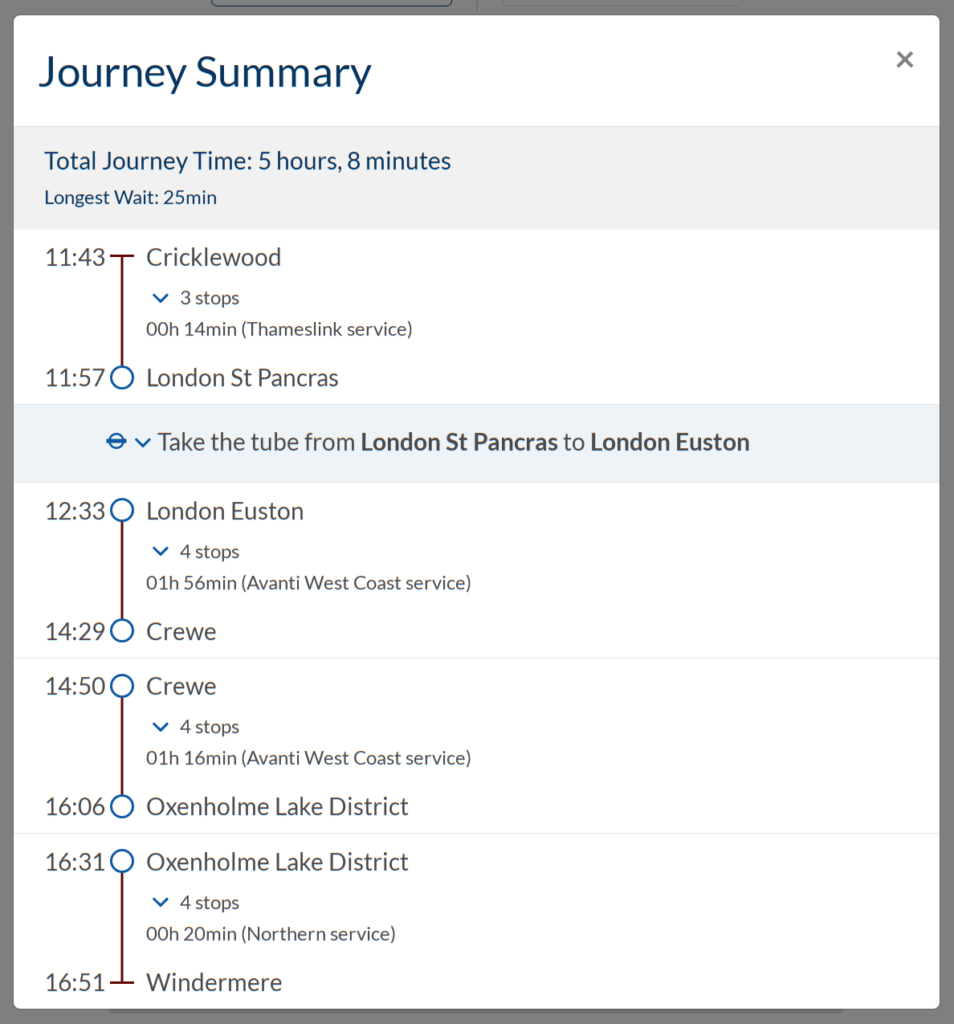
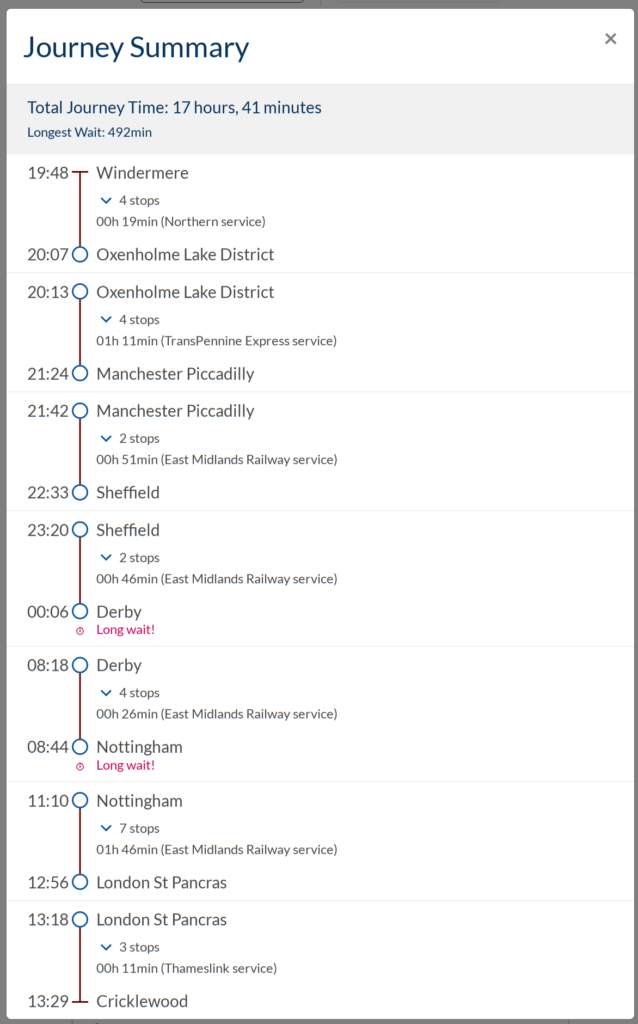
I bought the train ticket and tried to cancel my coach tickets, but unfortunately my National Express tickets from Preston to Nottingham were not refundable and £33 had to be written off, while my FlixBus ticket from Nottingham to London Finchley Road could be partially refunded with £5 deducted from the ticket value, i.e. £1.99 back as a voucher towards any future bookings within a year.
The trip
16 September
I had to use a paper ticket for my journey because the ticket permitted travel on London Underground, which doesn’t support e-tickets.
Although I didn’t want seat reservations as most of my timings are just provisional, with my intention to get on the first train in the right direction as soon as possible after my races, as my itinerary involved trains which were marked as reservation compulsory in the system (but not the case in reality), due to system limitation it had to issue seat reservations for all of the reservable trains in the itinerary, even including ones where seat reservations were optional. Therefore the ticket machine printed me 7 useless pieces of paper, what a waste 🚮🚮🚮🚮🚮🚮🚮!
Some of the “seat reservations” didn’t contain a real seat, saying coach *, no specific seat(s) reserved! It was because these trains had counted place reservations enabled for ticket quota purposes, as fixed-time tickets are quota-controlled and need to be issued with a reservation which ties the traveller to the service, so the coupon just said I had a place on the service. However as I was using a flexible ticket, “having a place (rather than a real seat) on the service” was totally meaningless, so the reservation coupons were just meaningless pieces of paper.
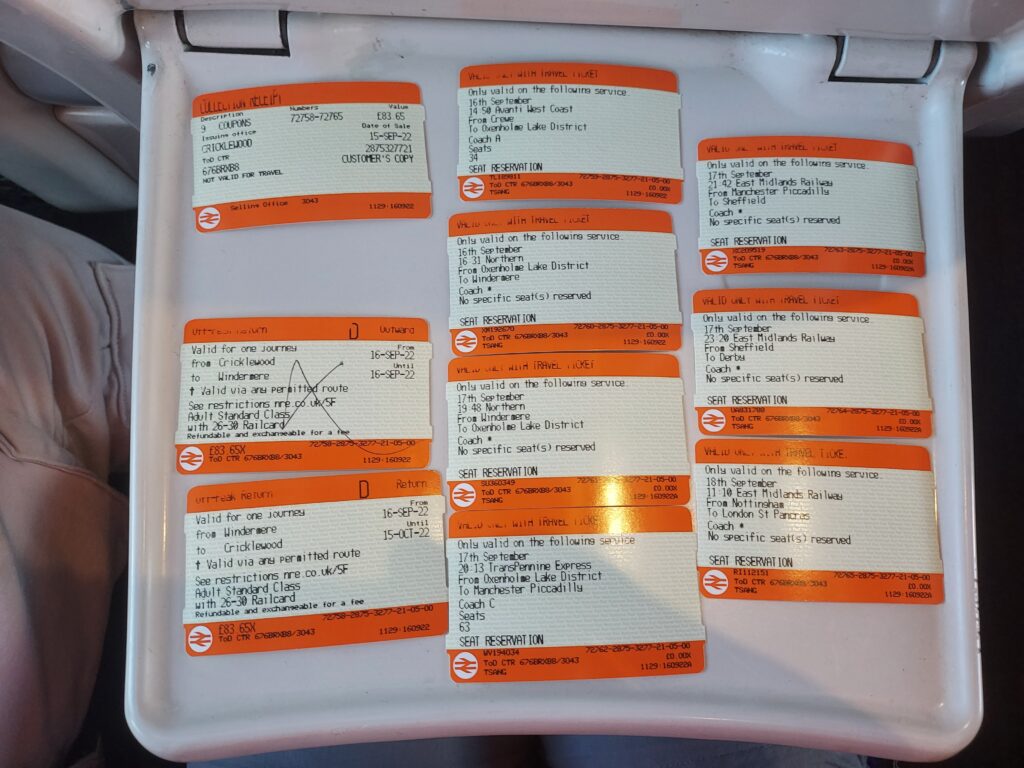
My journey started on a Thameslink service from Cricklewood, which was a local train towards Sutton. The train called at West Hampstead Thameslink, Kentish Town then London St Pancras where the journey planner would tell me to take the tube there to London Euston. However, they are so close to each other with just 650 m apart that it would be faster to walk between the stations instead of going underground.
However, when the train approached Kentish Town, an announcement was made “for the Northern line”. By transferring to the Northern line there, I would get to Euston faster and easier than walking between the terminals, or worse, transferring onto the tube at St Pancras. This is a secret which National Rail journey planners never tell you as the industry timetable data don’t contain such transfer link. The data contain every scheduled service on the National Rail network, and transfers between stations as “fixed links”, where Euston – St Pancras is defined as a tube link in the data. However, there is no Kentish Town – Euston link in the data, also missing is the direct Jubilee line link between West Hampstead Thameslink – Waterloo as well which is the fastest and the most convenient way to transfer between the lines. Nevertheless, the ticketing system is designed to allow such secret transfers by defining Kentish Town as a valid station for cross-London tube interchanges, so I can legally use my ticket on the tube from Kentish Town to Euston.
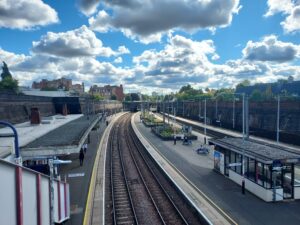
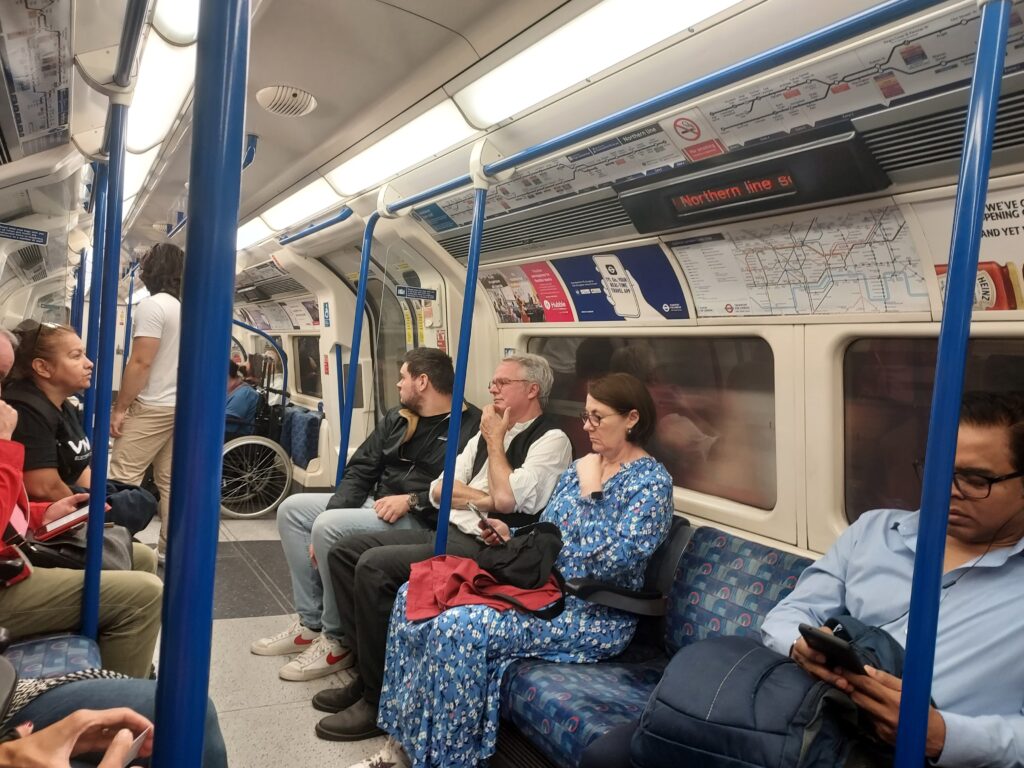
I arrived London Euston at a good time for the heritage train to Manchester, which would depart at 12:33. The departure was duplicated on the departure board because it was run by a charter operator, shown as “Charter Train” on the board, but an additional entry was created under the name of Avanti West Coast which was the marketing carrier of the service. Meanwhile, the 12:40 service, which ran on the same route with a regular high-speed train, was cancelled.
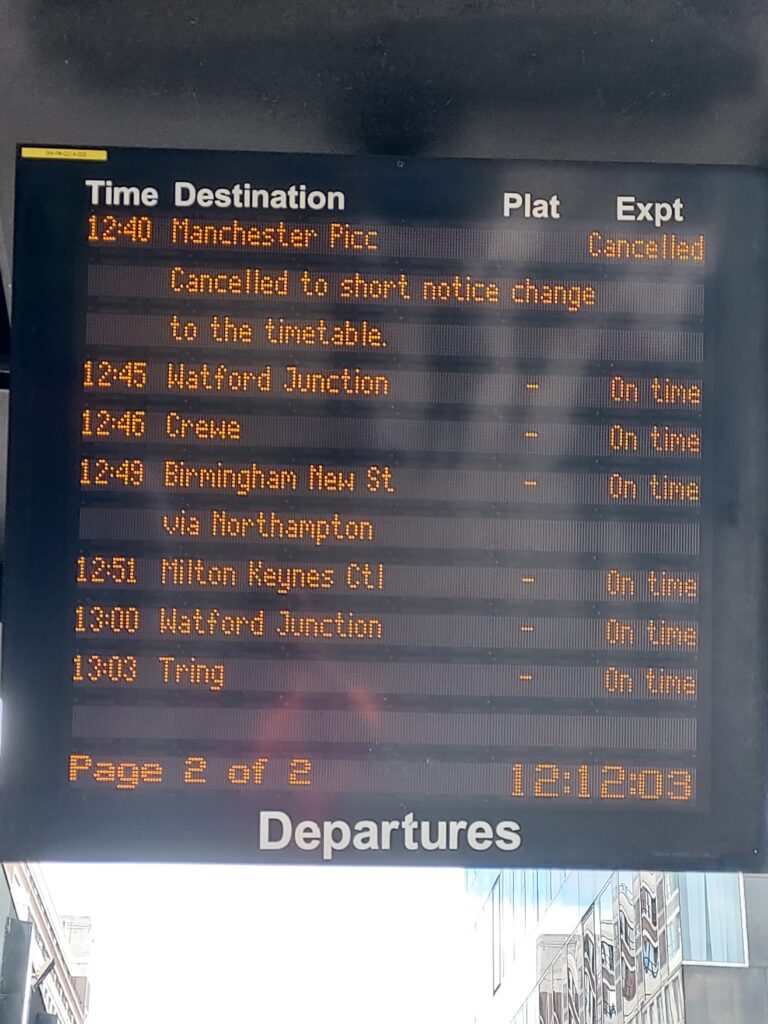
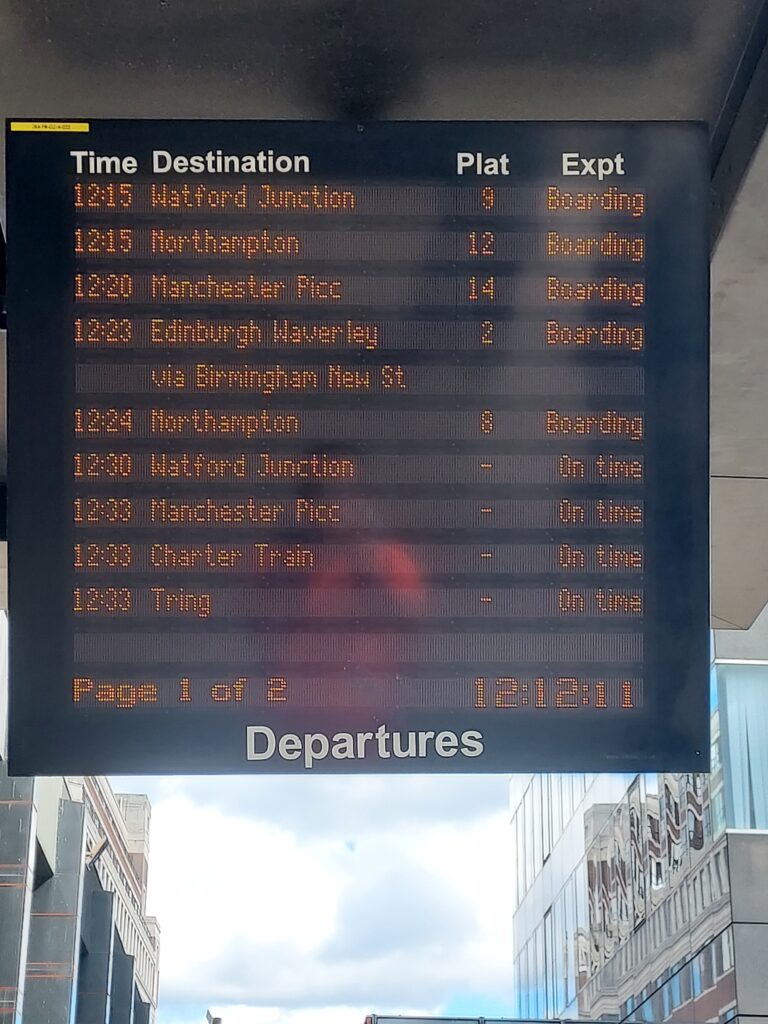
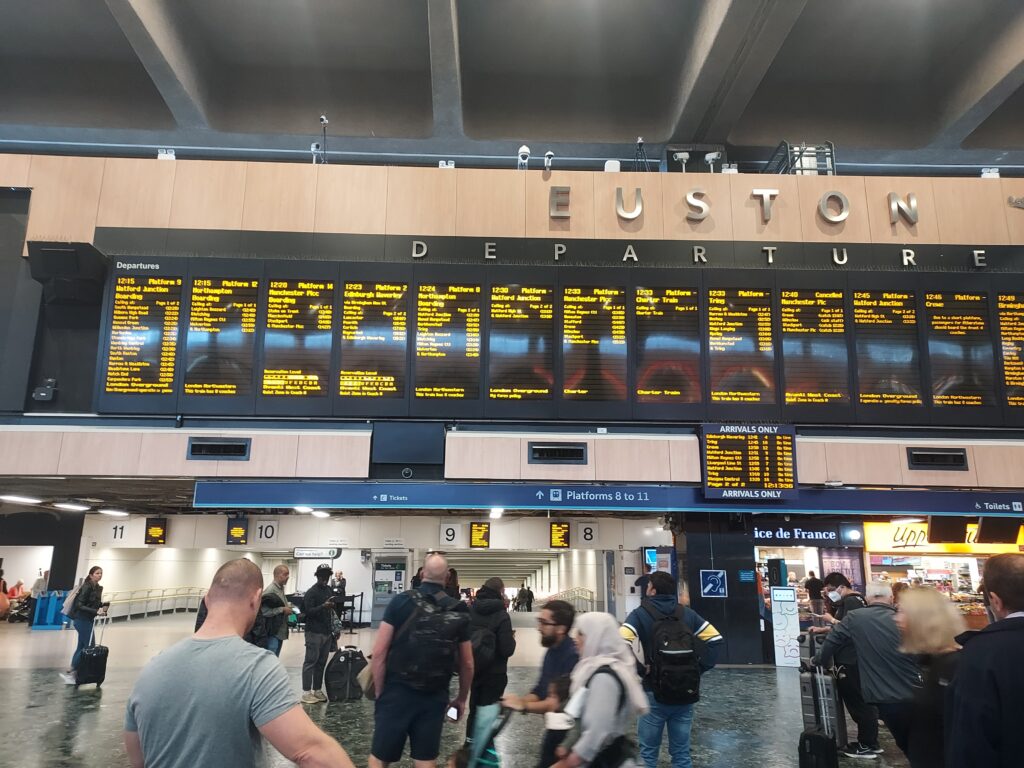
Here it is!
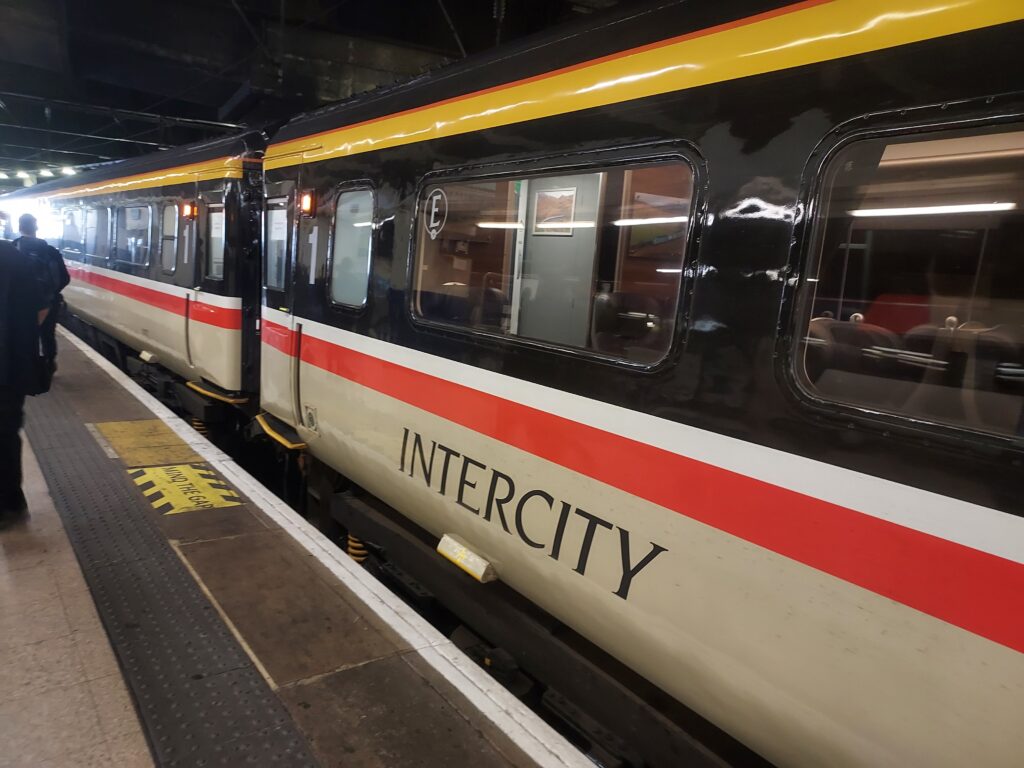
The train is wholly 1st-class but it was declassified while running as a capacity train for Avanti, so I could use my standard class ticket with first class comfort.
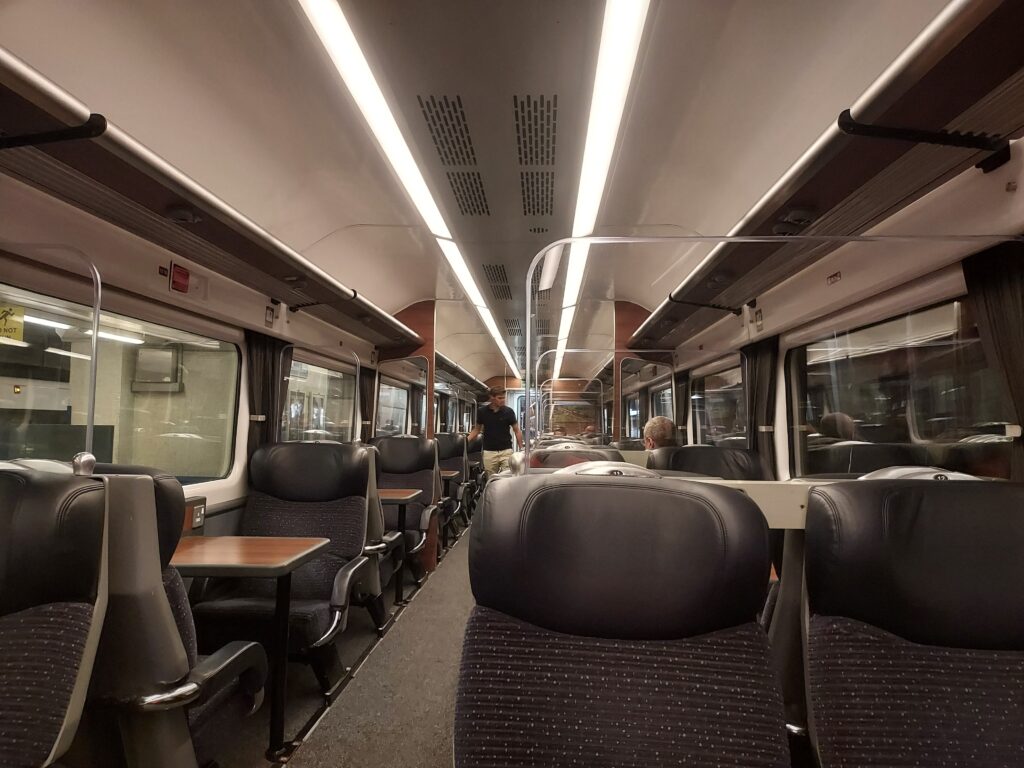
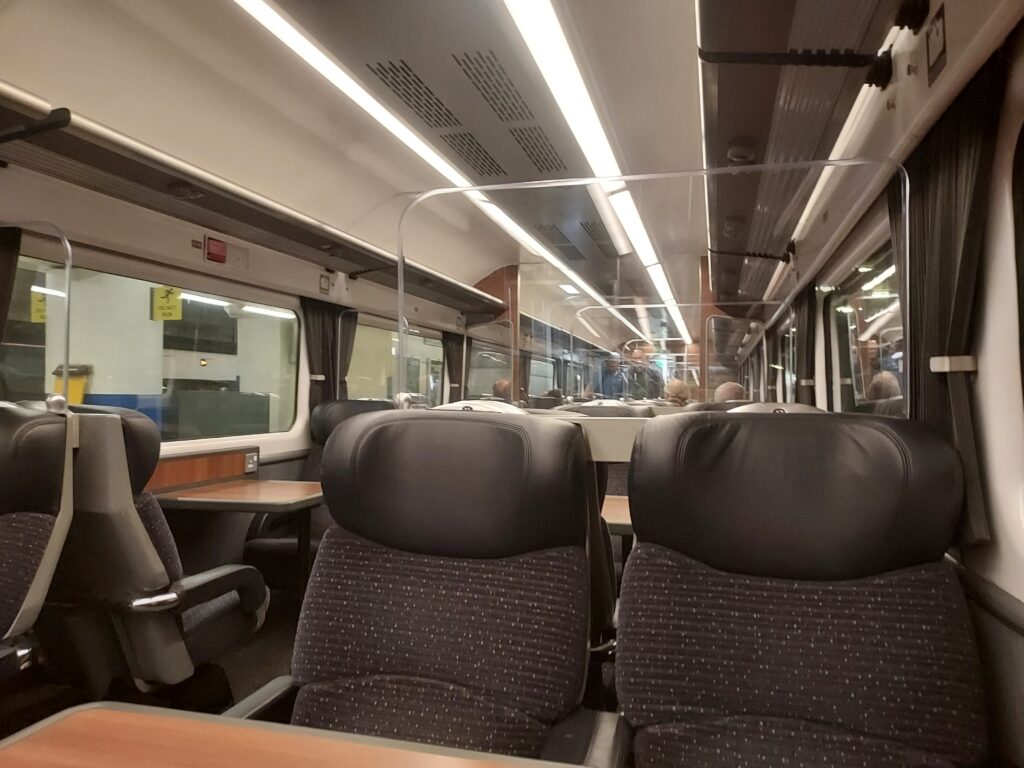
This heritage train has a maximum speed of 180 km/h only, compared to 200 km/h by regular high-speed trains. It also took a long way to accelerate to the line speed after departure.
The West Coast Main Line between London and Trent Valley is quadruple-tracked, so I could see the moment passing a slower LNR train en-route.
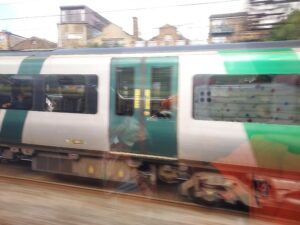
The train called at Milton Keynes Central, Nuneaton, Stafford then Crewe where I alighted as it would head to Manchester, while I was aiming for Lancaster which is on another route. The heritage train is a slam-door train, which means the doors are slammed while closing, instead of doors on modern trains which are controlled by an electric motor.
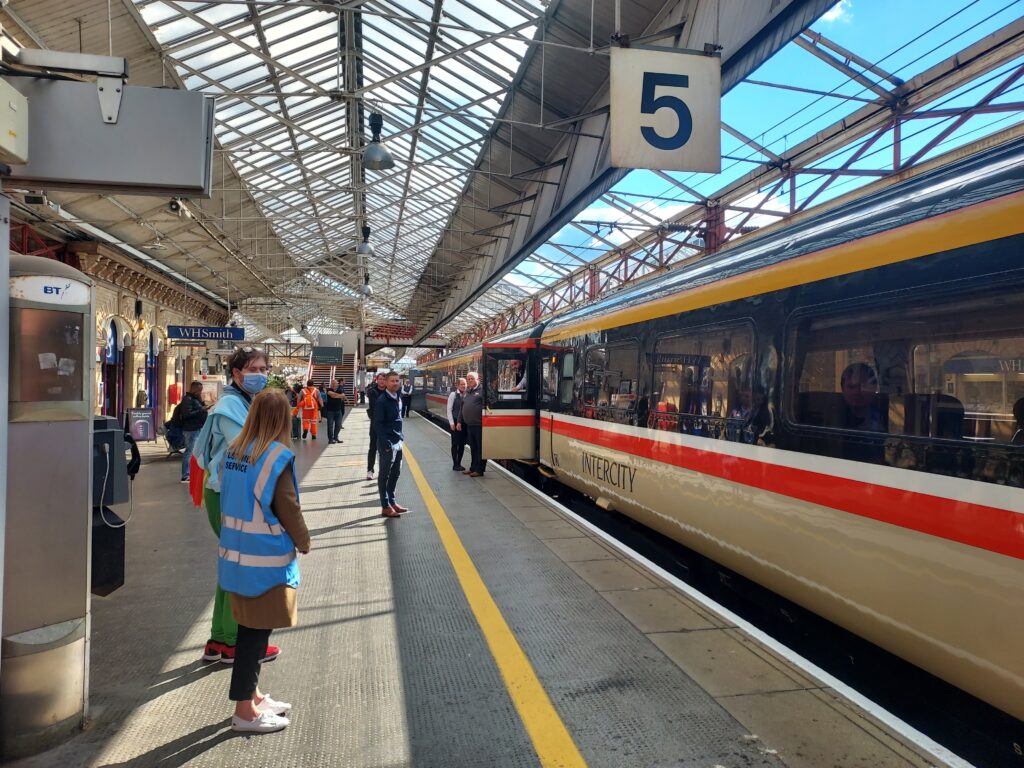
I then switched to the next train going on the route to Lancaster, which was a regular Avanti West Coast high speed train to Glasgow which was crowded.
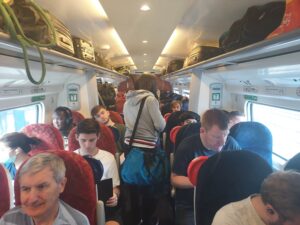
The train continued its journey on West Coast Main Line, calling at Warrington Bank Quay, Wigan North Western, Preston, however this particular service didn’t call at Lancaster (most London – Glasgow trains do) but instead ran non-stop to Oxenholme Lake District afterwards, so I had to get off at Preston to switch to another train which called at Lancaster, which was a Northern service to Windermere.
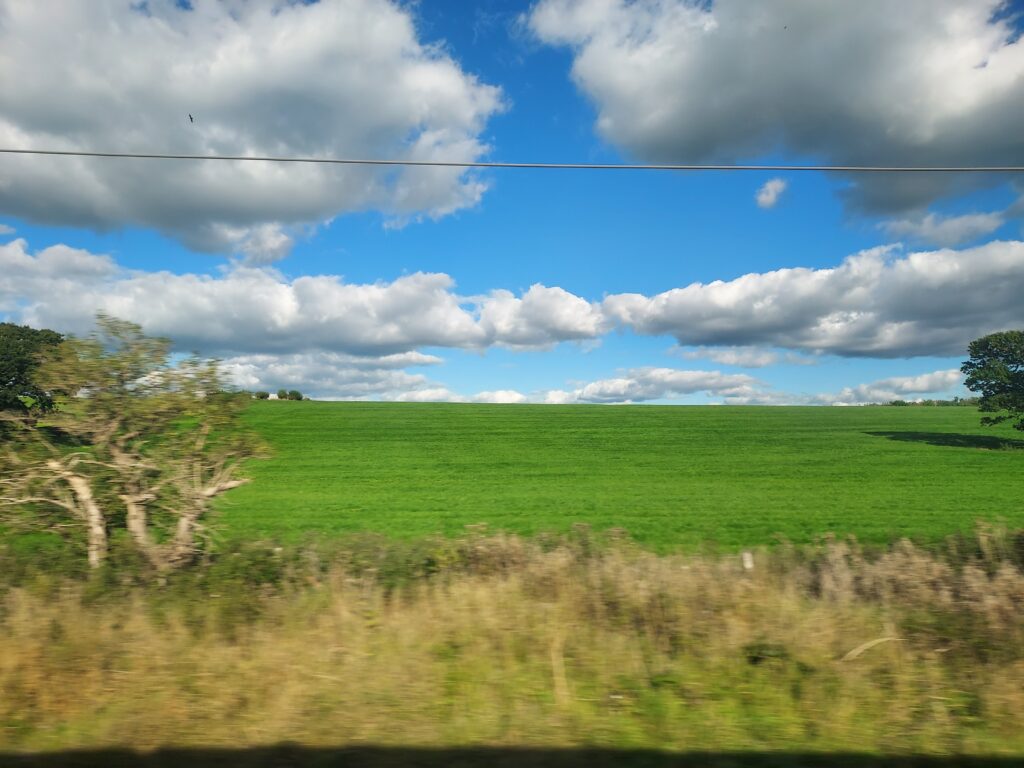
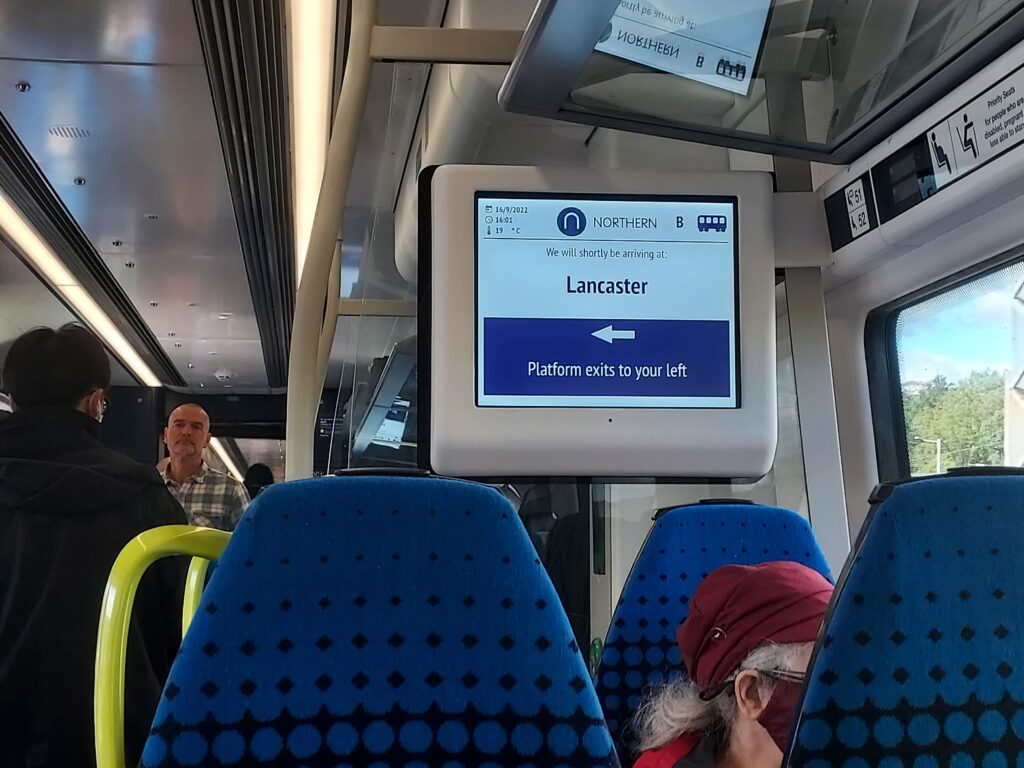
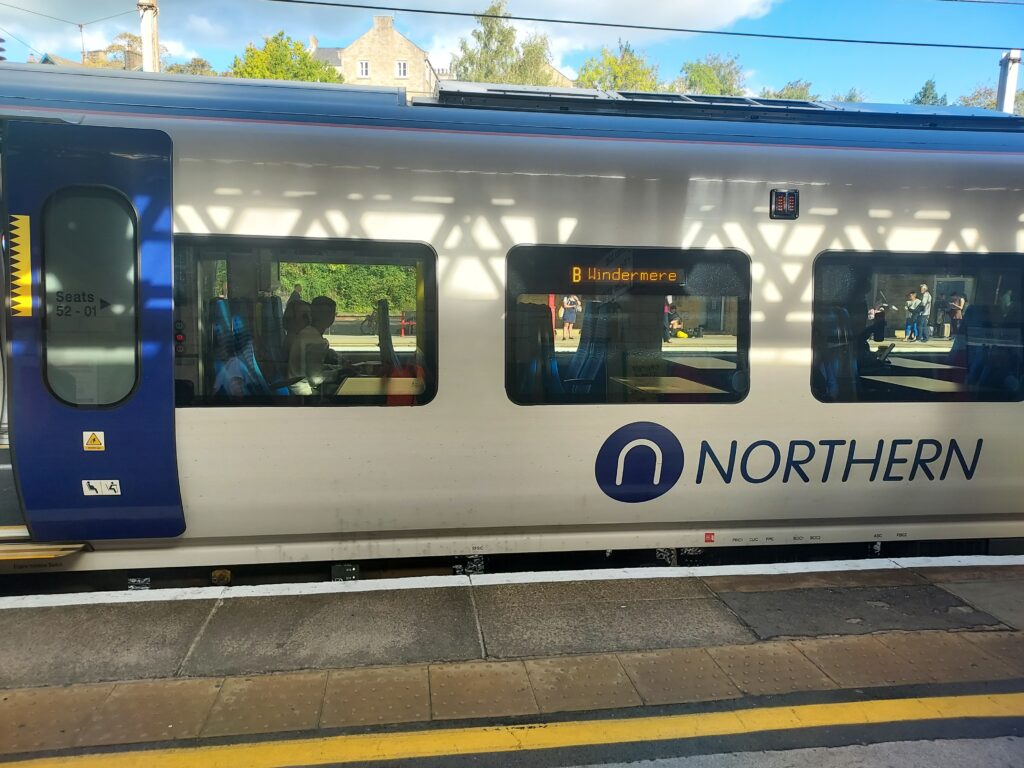
I had my dinner at Lancaster, the last city before going into the Lake District.




I visited a conveyor belt sushi restaurant for my dinner, and ordered some set sushi and donburi in addition to the sushi plates.
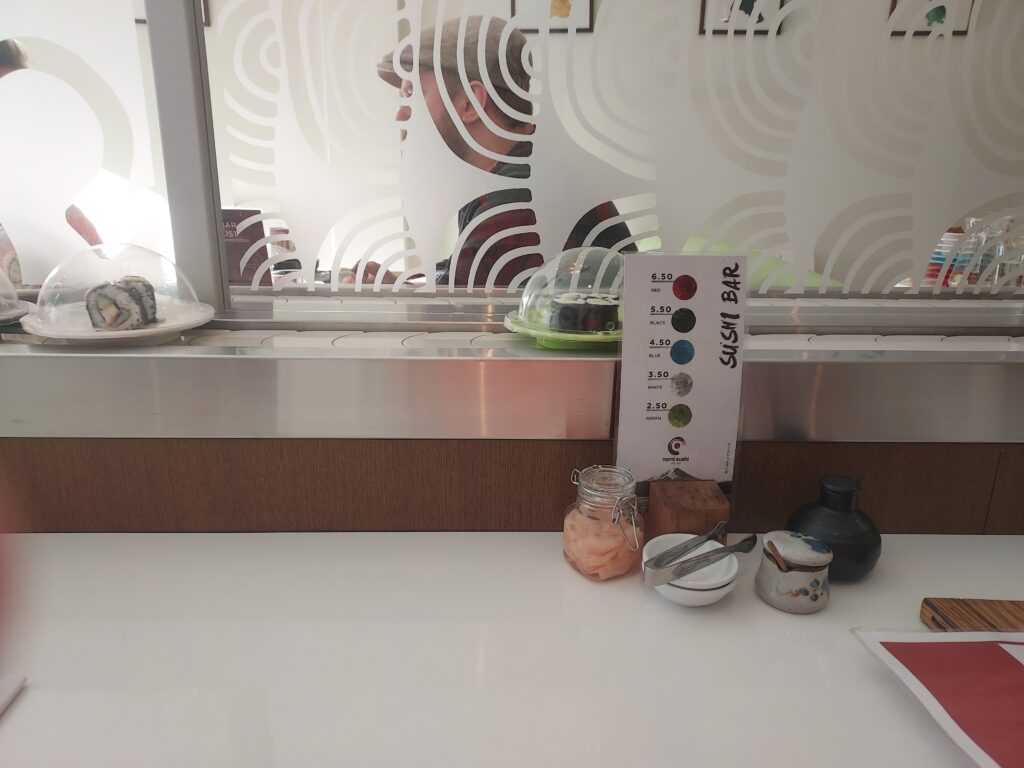

After my dinner, I took a train to Windermere, and went straight into a hotel next to the station.
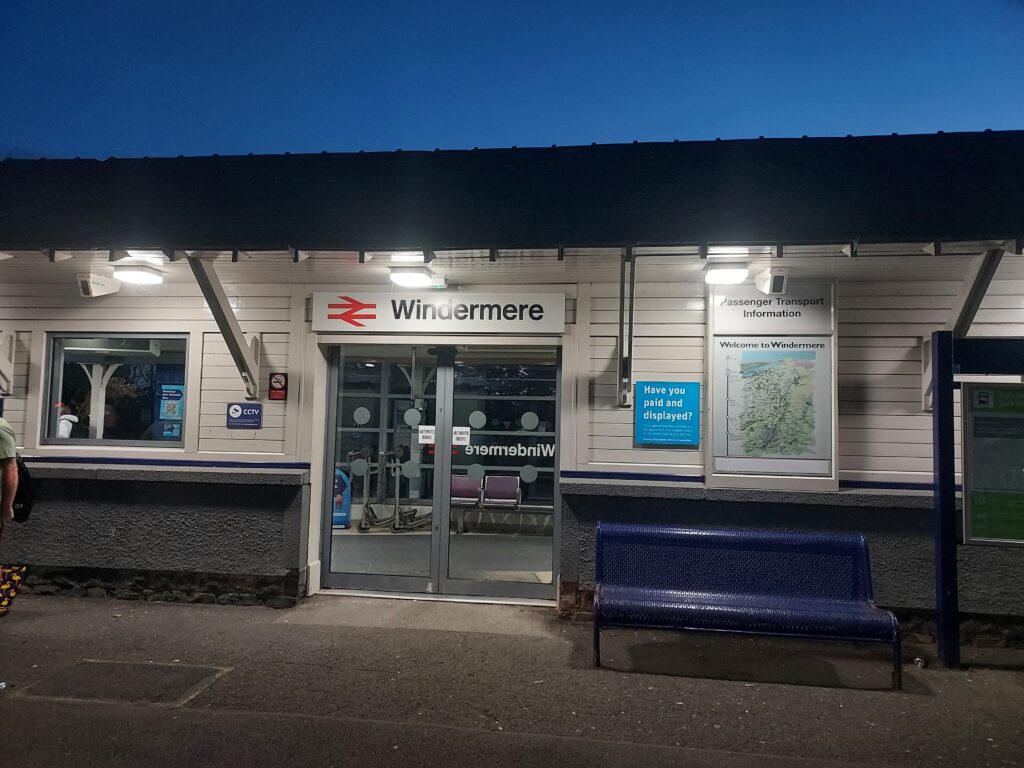
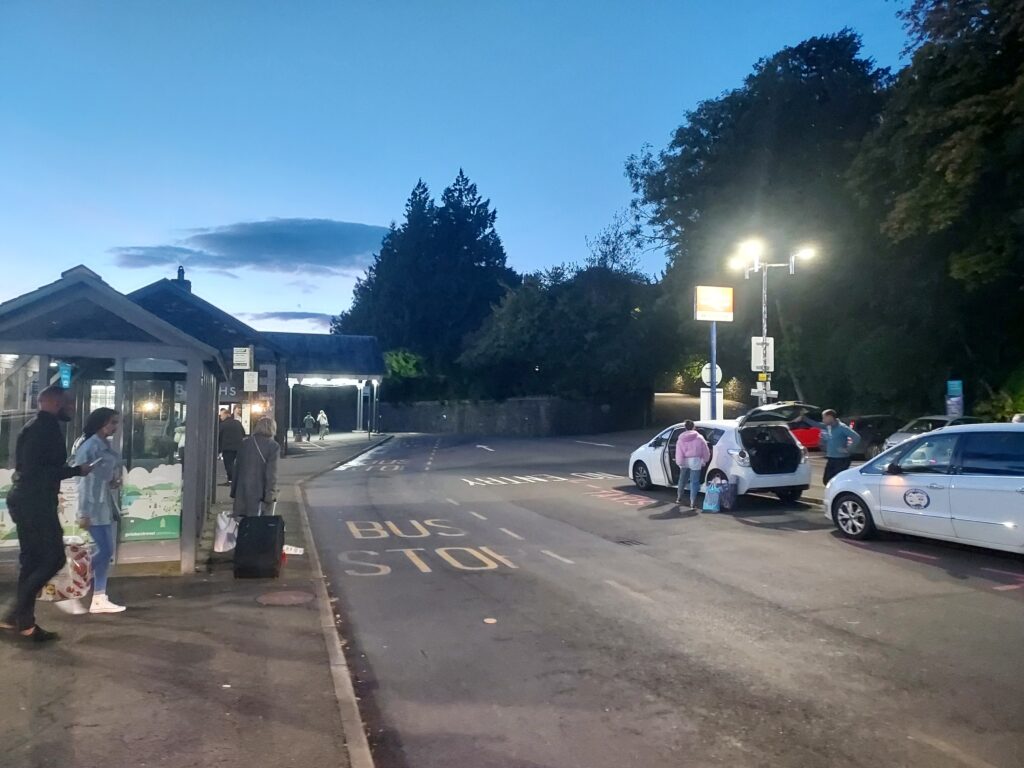
17 September
I took the route 6 bus from Windermere station to Fell Foot, which was served by a minibus. I was the only passenger for the most of my journey, with another passenger for a short haul between Windermere and Bowness only.
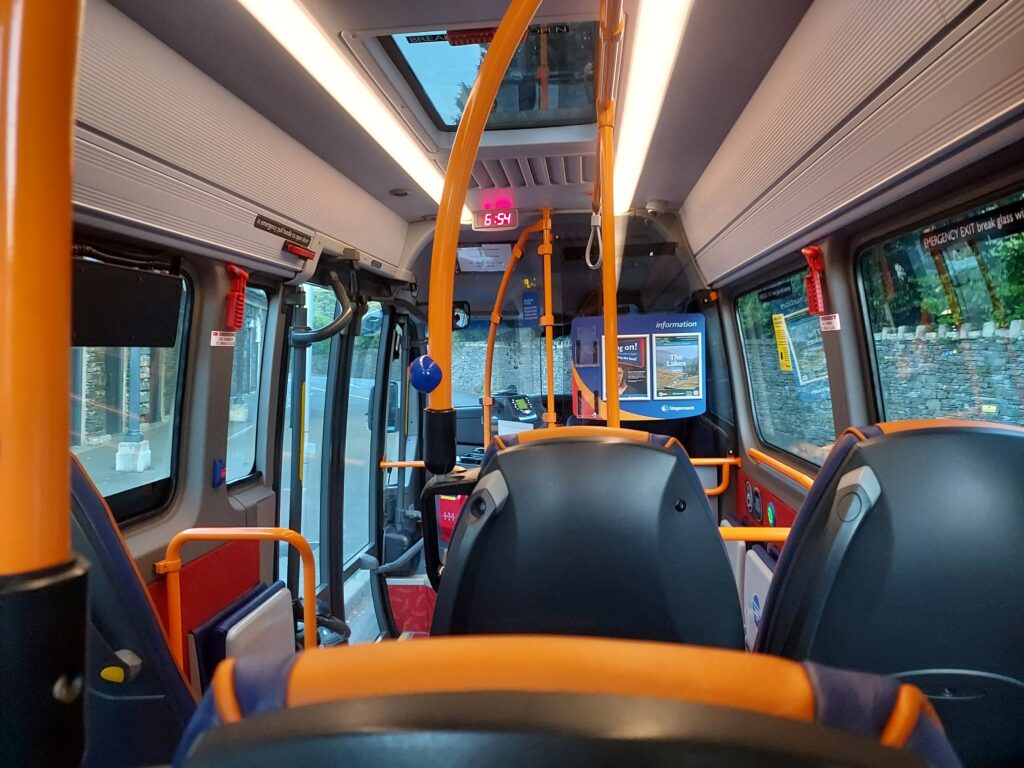
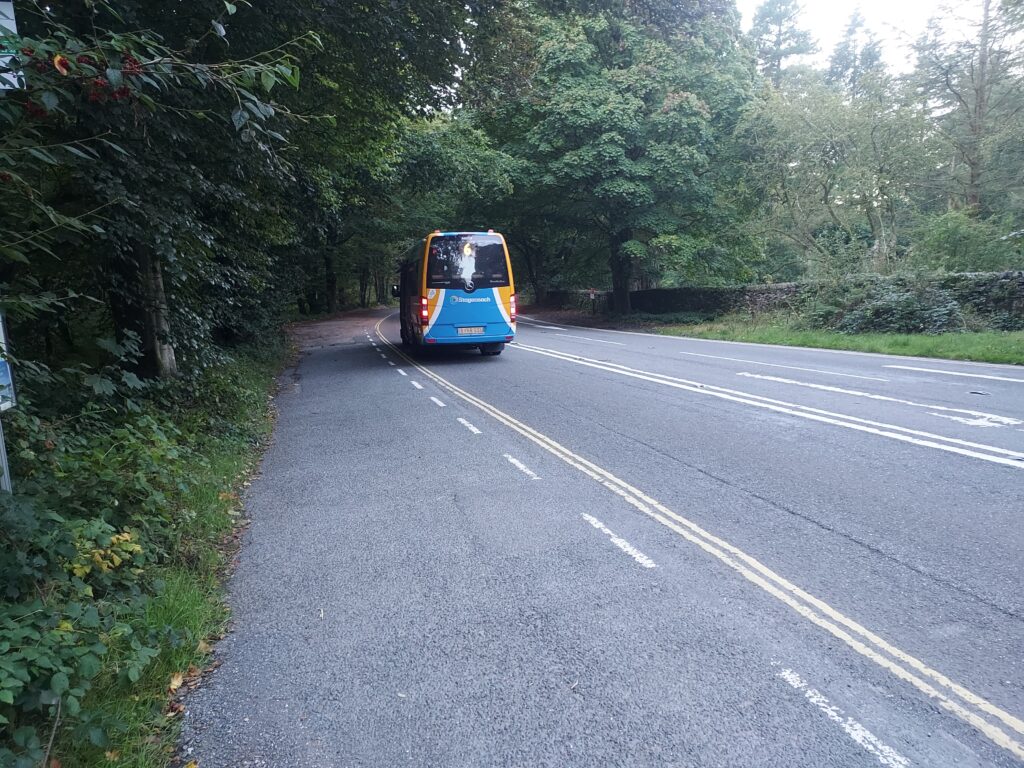
I then did the first race on my trip, BLDSA Windermere. Unfortunately it was not the day for me and I developed extreme leg pain during the swim after a strong start, and aborted the race just 3.5 km from the finish. The race finish was at Waterhead, Ambleside, where frequent buses to Windermere on multiple routes, such as 555 and 599, are available. I didn’t wait until the presentation ceremony as I didn’t finish the race, and I didn’t want to get to my hotel, which was a long way away in Derby, too late in the evening, so I left the race venue at about 17:30 and took a bus back to Windermere station.
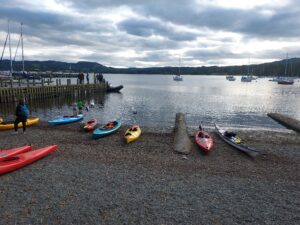
Trains on the Windermere branch run approximately once per hour, however, only one out of 3 trains runs through onto the main line to Manchester, with the remaining turning back at the junction, Oxenholme Lake District, as a shuttle service. The one I boarded was just a shuttle service so I had to switch trains at Oxenholme Lake District, the gateway to the Lake District.
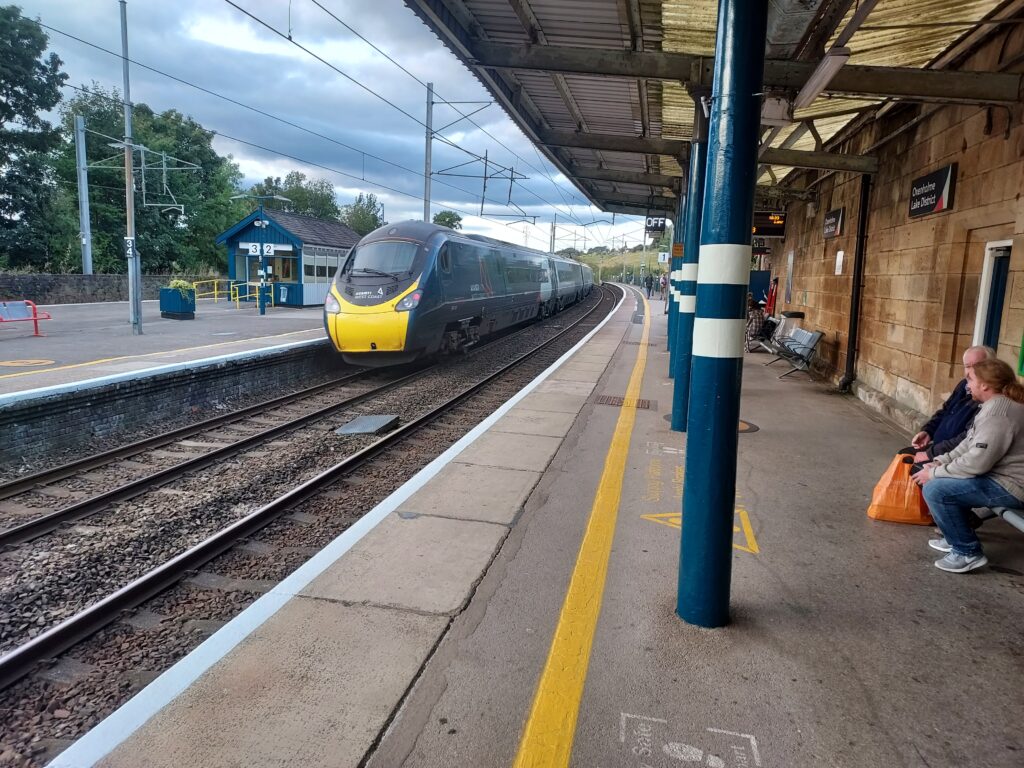
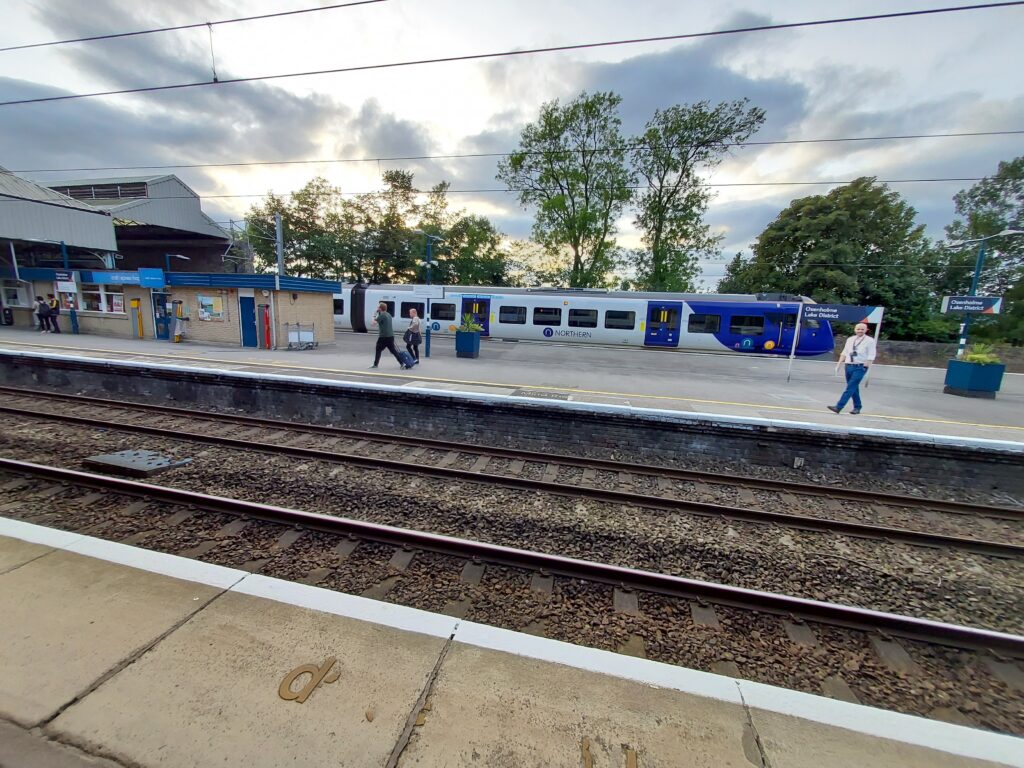
My hotel that night was in Derby, therefore I needed to travel through Preston, Manchester Piccadilly and Sheffield to get there. I always boarded the first train in the right direction until the last station where it would no longer run on my route afterwards, so I boarded an Avanti West Coast train to London Euston and alighted at Preston, then a Northern train to Manchester Airport and alighted at Manchester Piccadilly, then an EMR train to Nottingham and alighted at Sheffield, and finally another EMR train to Derby without any significant delay en-route.
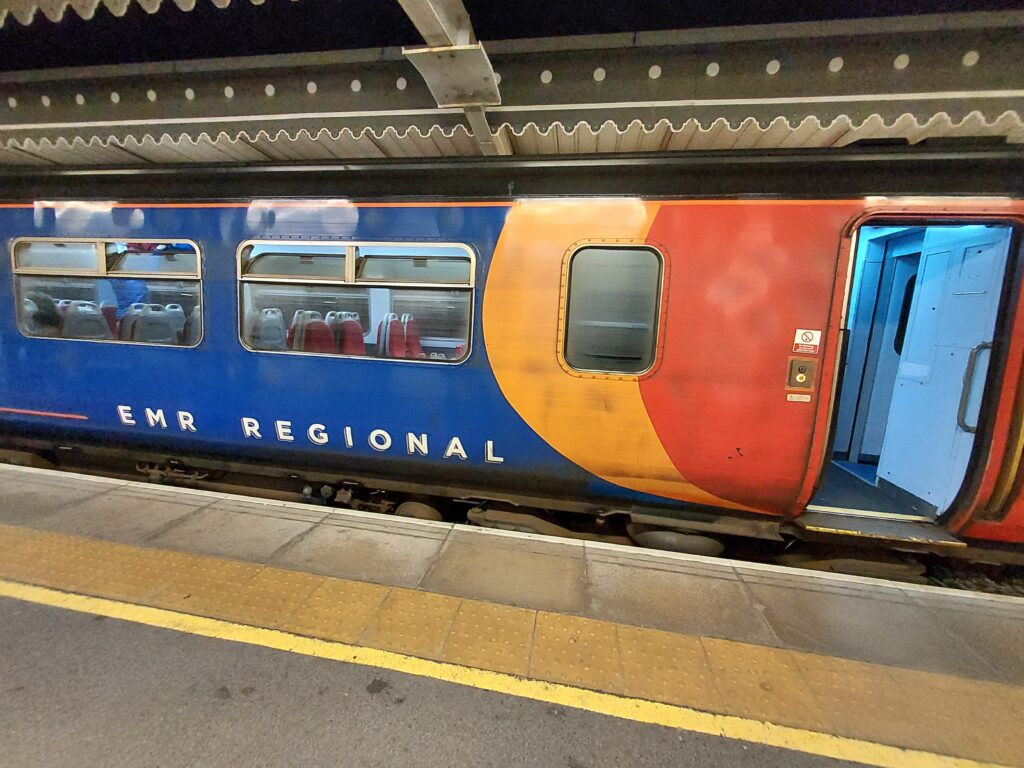
Unfortunately there was no bus direct from the station to my hotel, and I had to walk 2 km to get there under my leg pain.
18 September
I walked back to the train station to take another EMR Regional train to Nottingham, then took the tram to Meadows Embankment for the race. The tram fare was expensive – £2.70 single and £4.70 daily cap, although there was a £1 short hop fare, it didn’t apply to my two-stop journey because it went across the zone boundary. I was also surprised that there were stop buttons in the tram, and it did skip stops when no one pressed the button, like a bus despite it was a tram rather than a bus.
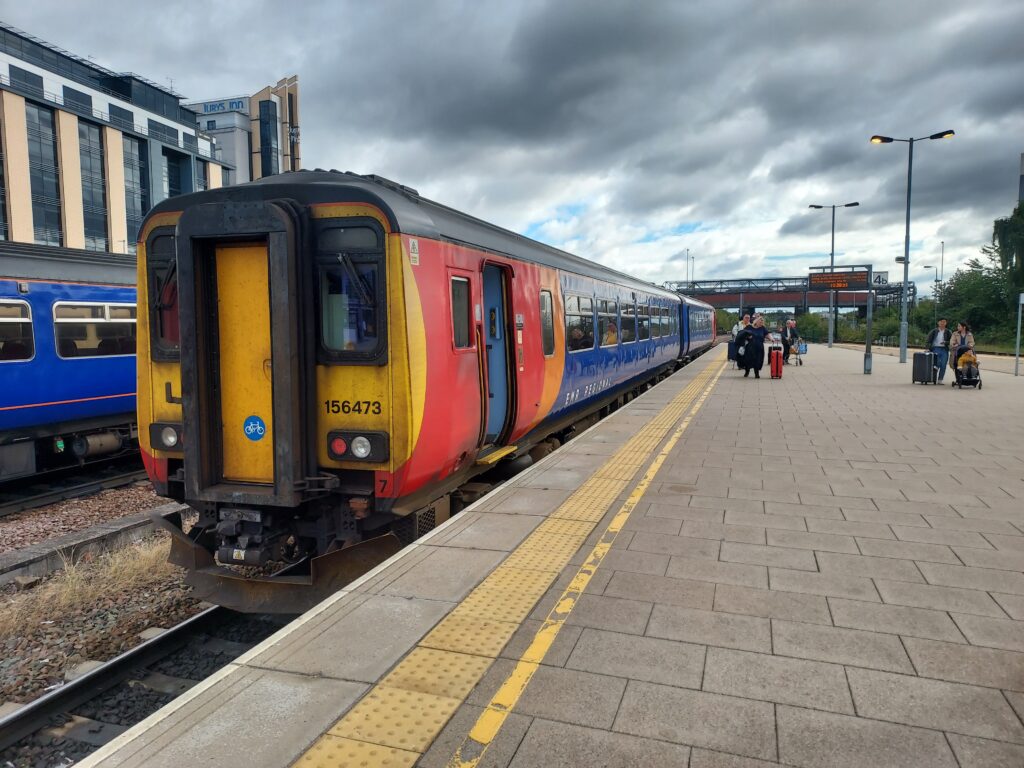
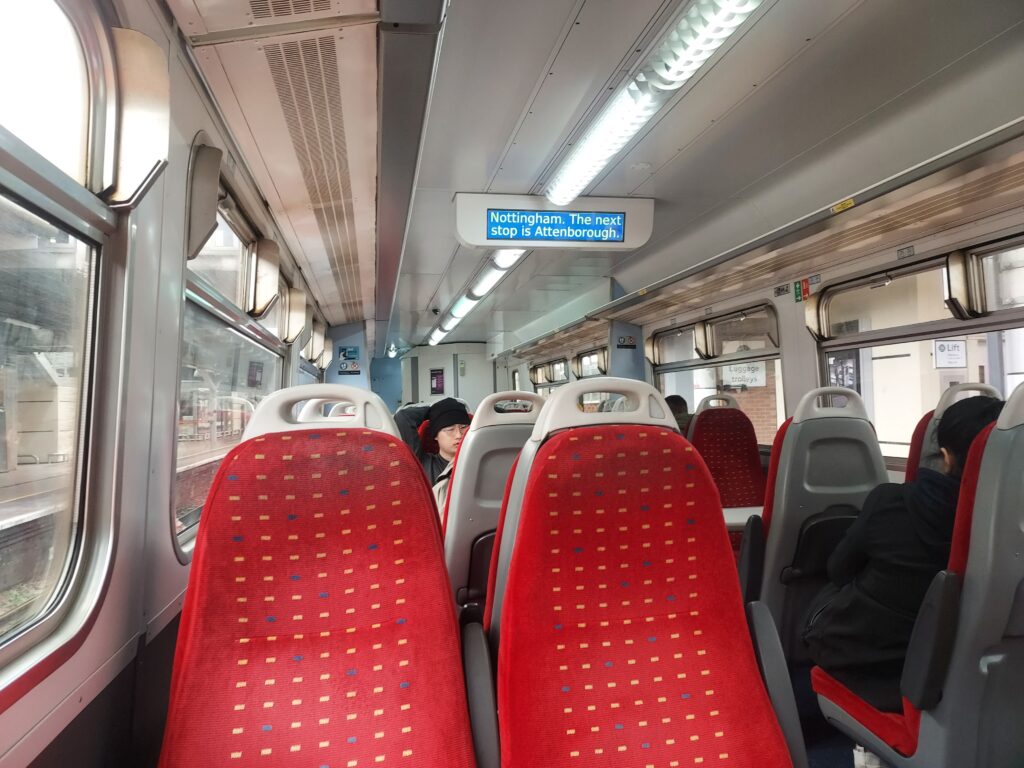
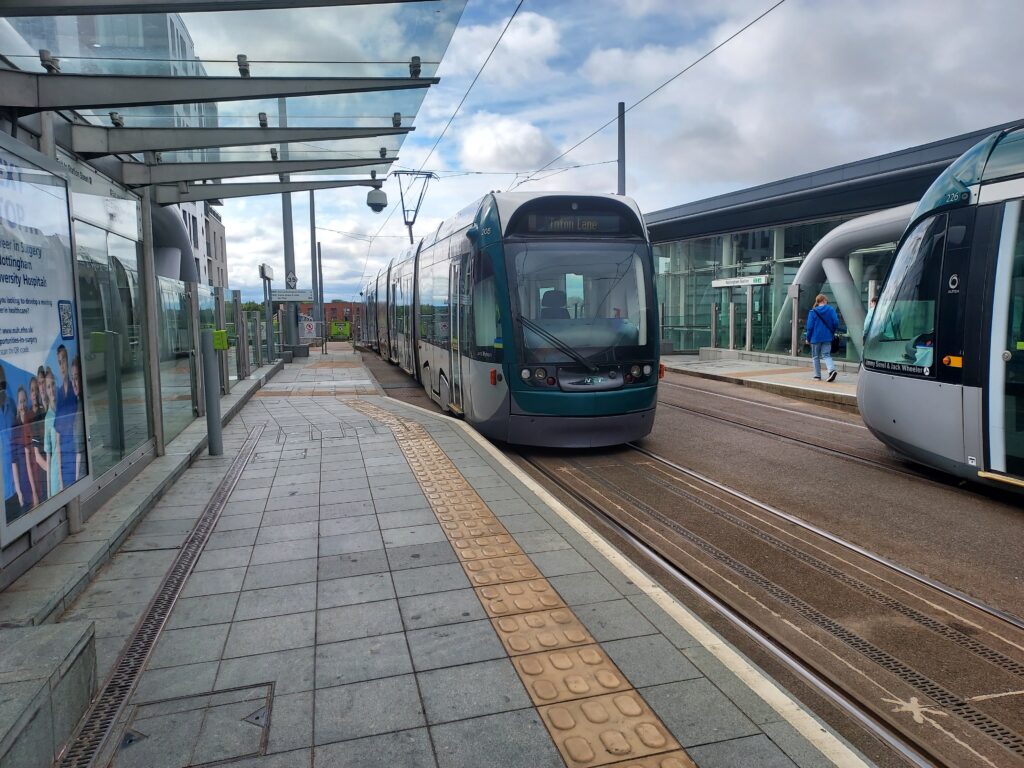
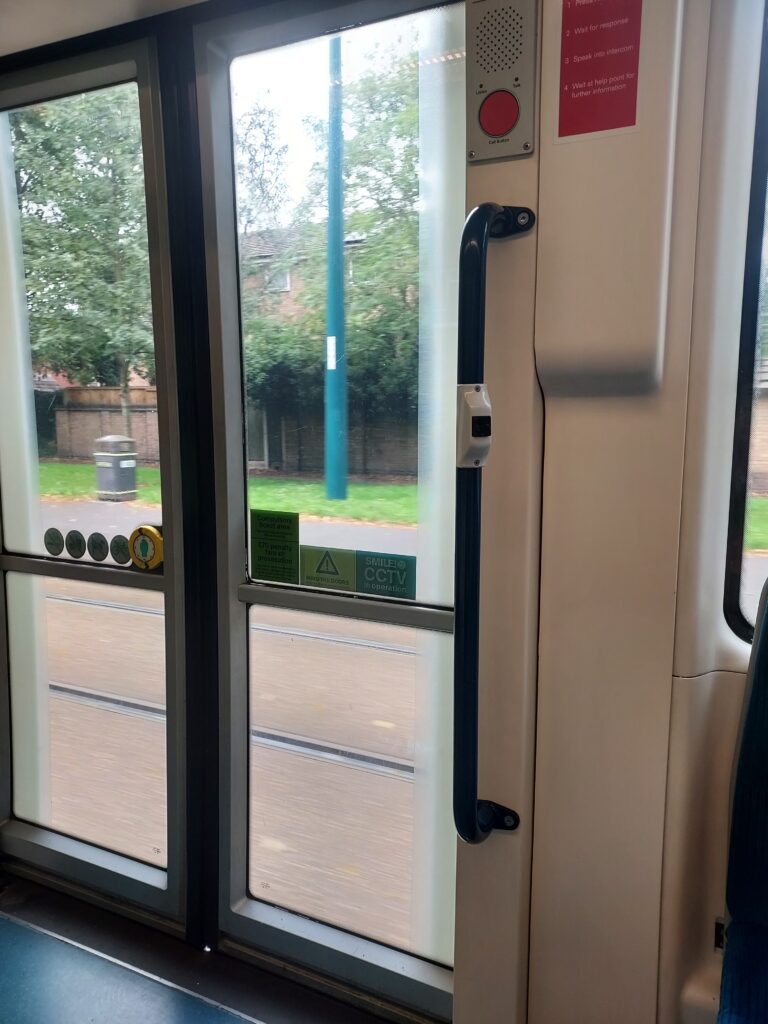
I ended up the 14th out of 16 in the race. Afterwards I took the tram back to the city centre with my friend and have lunch.
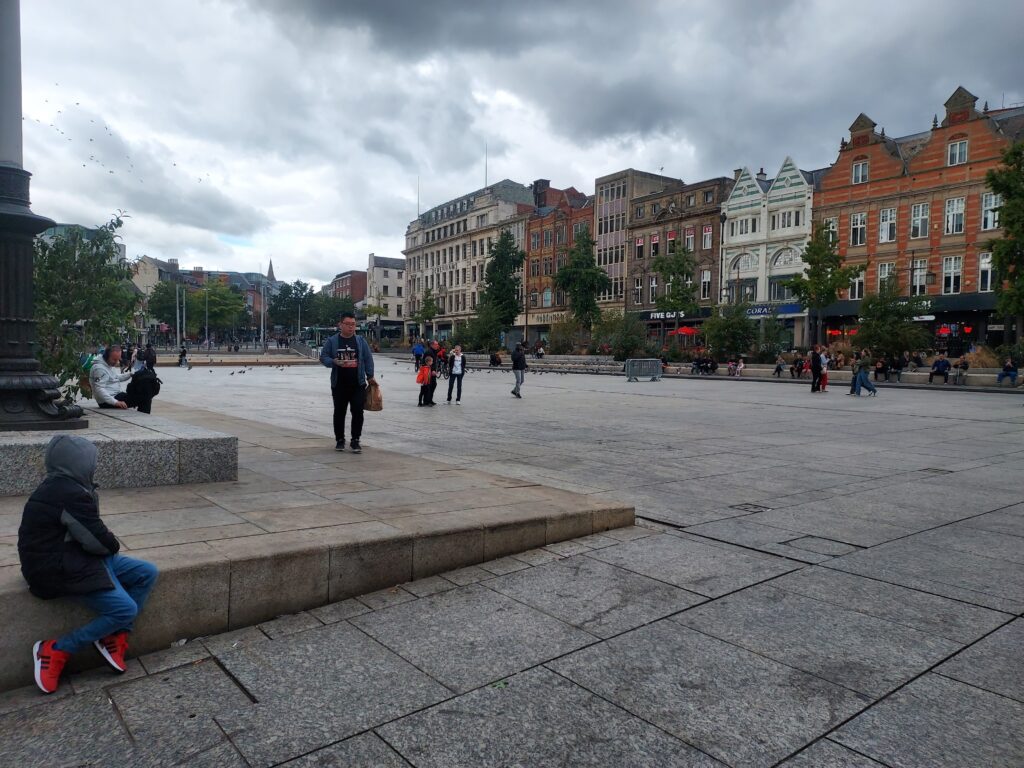
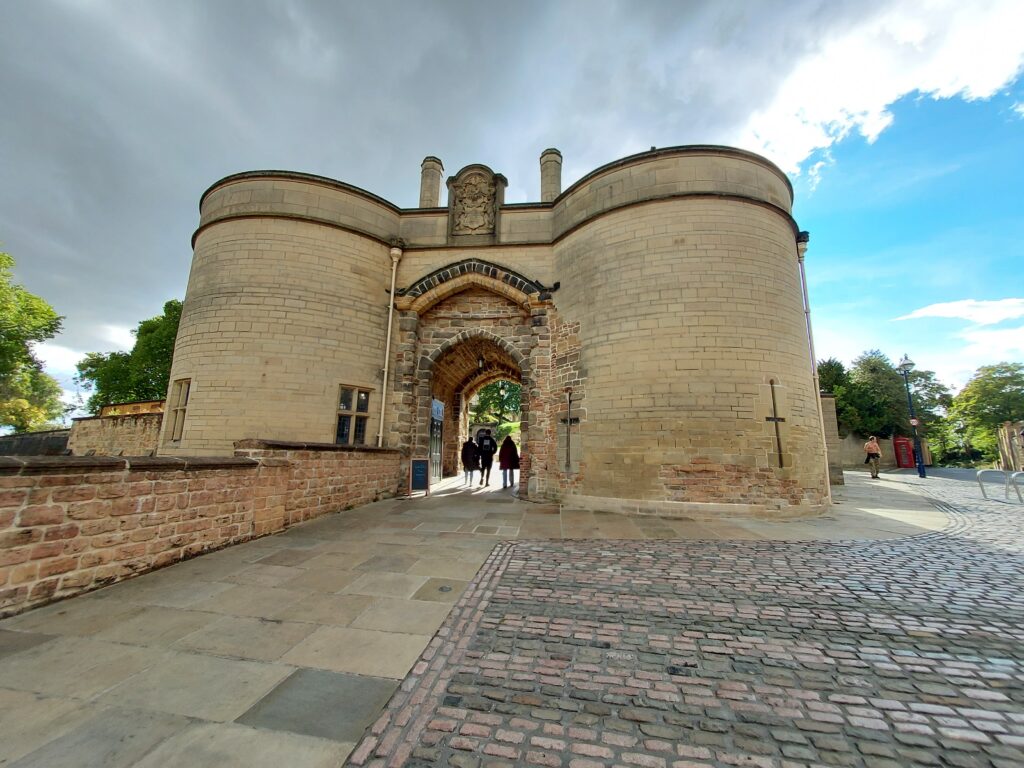
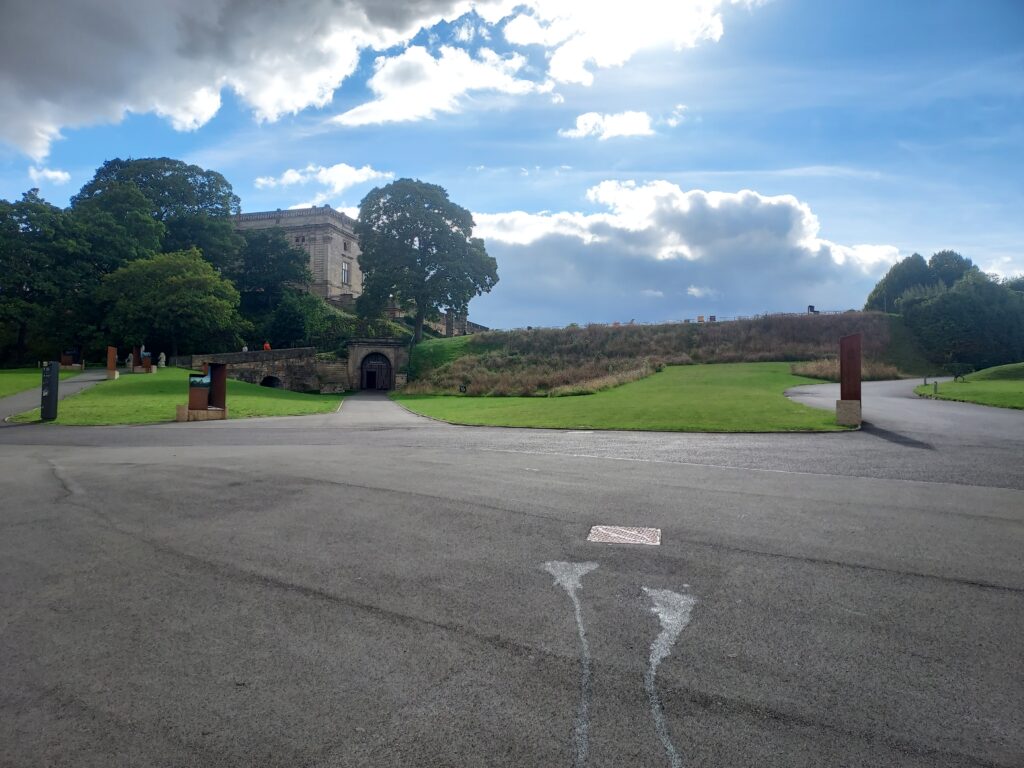
I went home afterwards. I went back to the train station to take an EMR Intercity train which ran non-stop after Kettering to London St Pancras, passing my home Cricklewood without stopping.
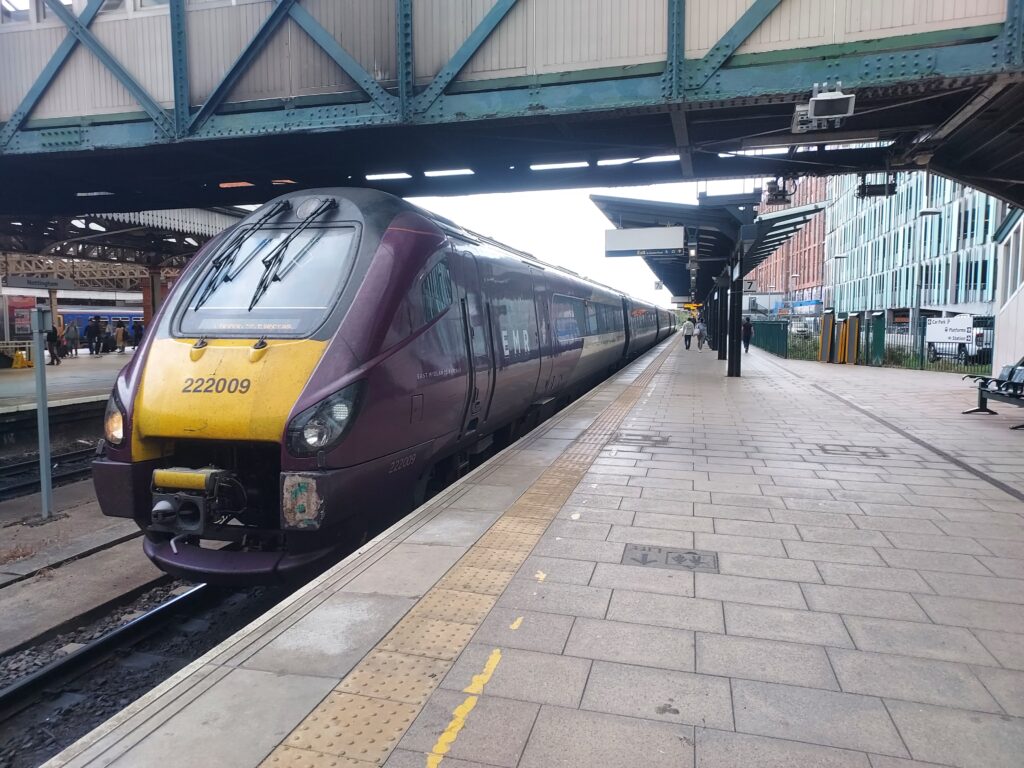
The train brought me to London St Pancras, the grandest train station in the whole of United Kingdom which is also the Eurostar terminal. It is in fact 4 stations under one roof, including the Midland main line terminal (to Nottingham and Sheffield), the international terminal (to continental Europe), the domestic high-speed terminal (to Kent) and an underground suburban station (not to be confused with the London Underground, i.e. Tube station, which is connected but in a separate building). I got off the intercity train at the Midland main line terminal and went to the underground station in order to take a suburban train back home.
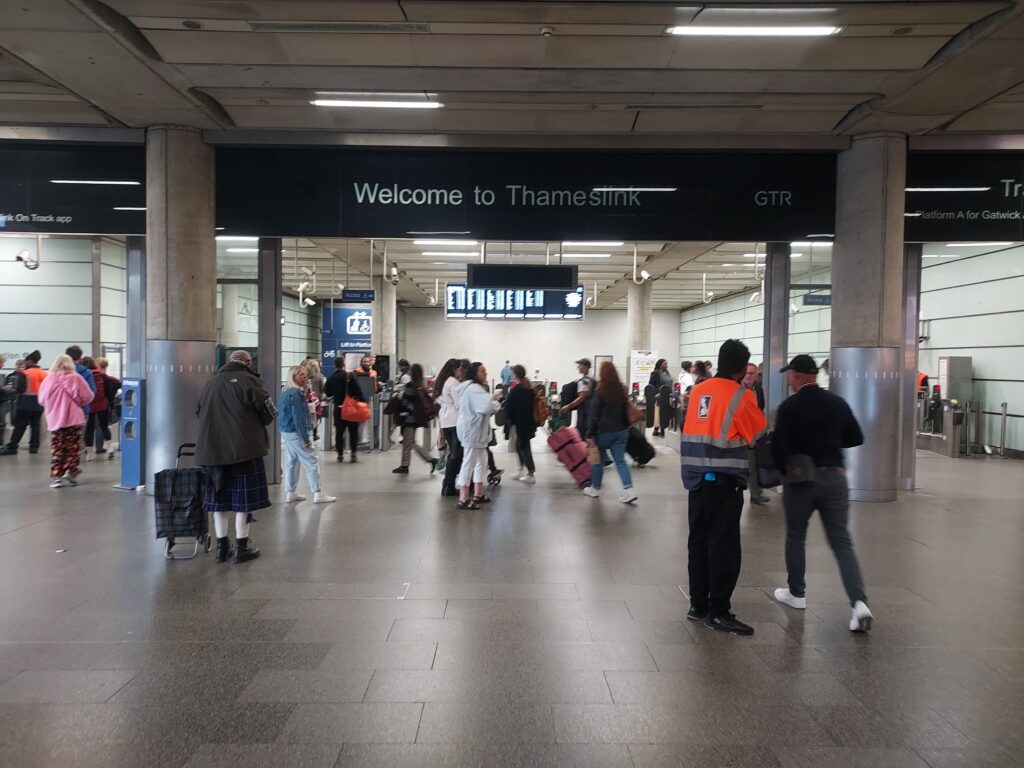
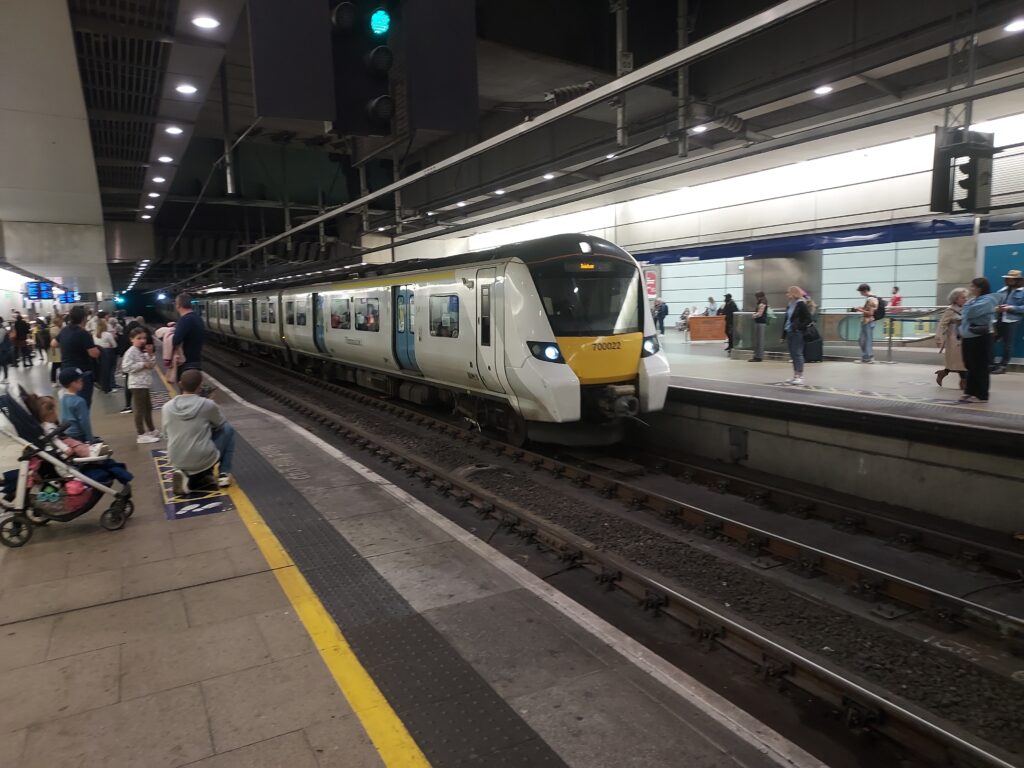
The suburban station is part of the Thameslink network, which is a network of suburban train routes aggregated to the only main line railway crossing London in the North-South direction, offering an alternative to the London Underground in the centre of London.
I finally took a northbound train back to Cricklewood, on the same line I came from Nottingham, to end my journey.